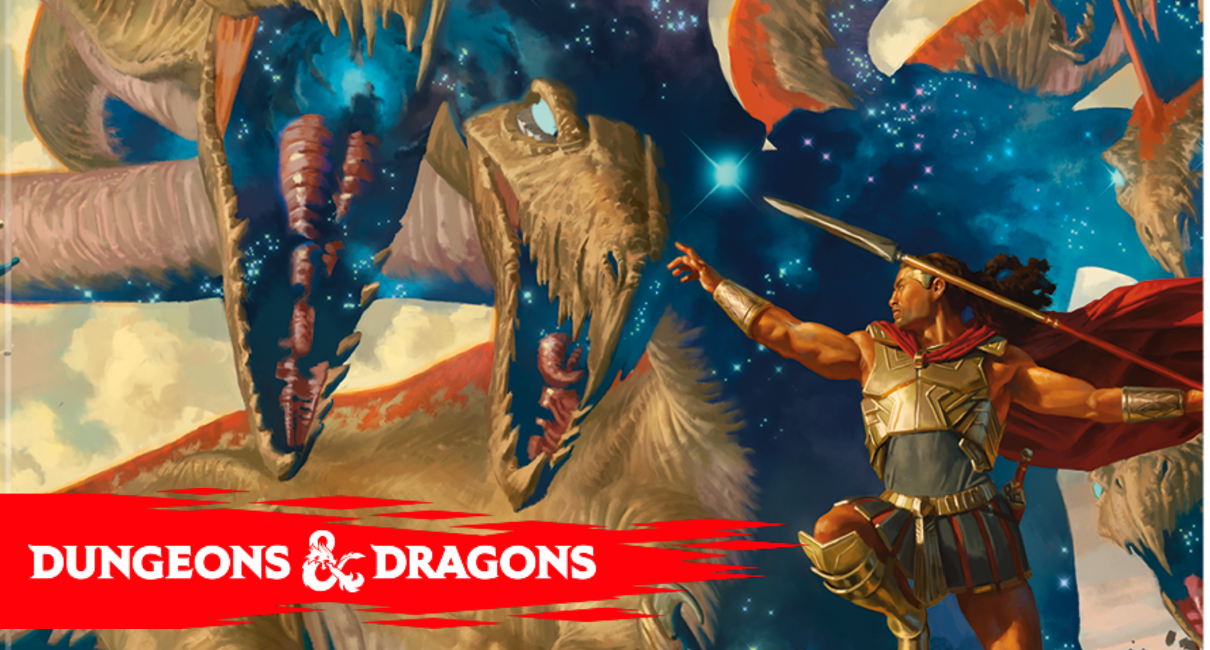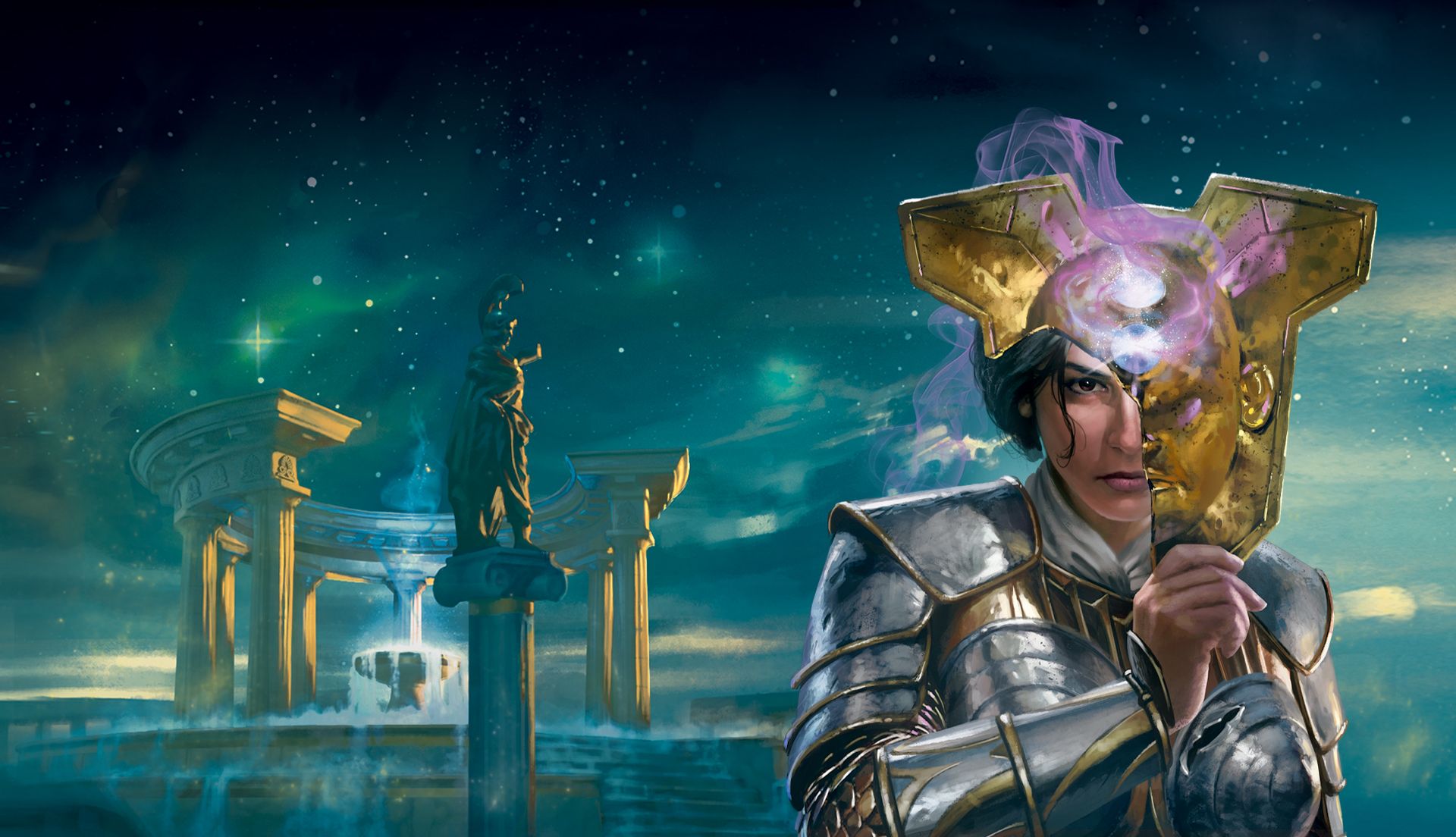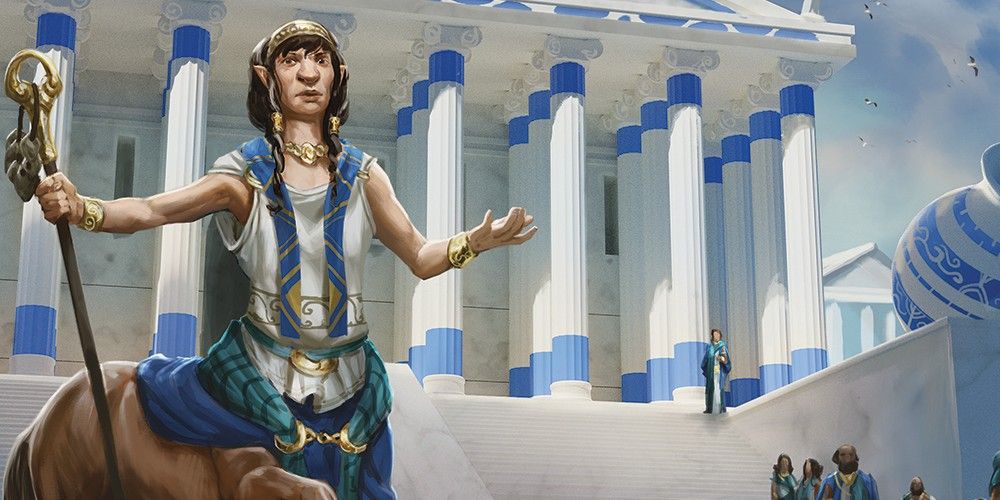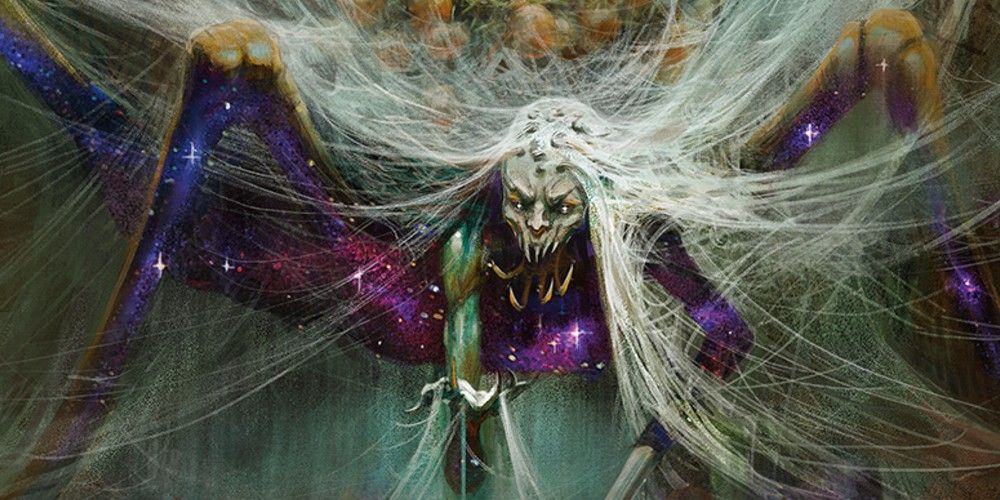It's a very interesting time to be playing Dungeons & Dragons, because almost every aspect of the game is being challenged. The global pandemic has changed the nature of actually playing D&D, creating a need for DMs to rethink their campaigns for a digital format. The culture surrounding the game, meanwhile, has had its reliance on racial stereotypes called into question. Many are calling for a complete rethinking of race in D&D, both on a mechanical and social level. D&D has to change if it wants to remain the definitive TTRPG.
Mythic Odysseys Of Theros is a new book that doesn't give an easy answer to any of these issues. It does, however, empower DMs and players with a wealth of creative options.
Giving DMs The Power Of The Gods
Theros is set in the Magic: The Gathering world of the same name, a world itself inspired by Greek mythology. This imbues Theros with the most classic of storytelling themes: tragic flaws, divine quests, and the question of whether fate can be defied. The emphasis on the divine in particular gives DMs handy tools to keep a campaign moving. The gods of Theros aren't exactly Zeus and friends, but they do like to mess around with mortals. Not to mention they're petty jerks.
These petty jerks have cool powers, though, and are willing to share them with heroes who serve them well. That means new Legendary magic items, spells, and even feats for the worthy. Handouts are mostly done through the Piety System, a mechanic that literally keeps score of the times a character made their patron happy. The system is inspired in how straightforward it is; players of any type will understand the give-and-take. Roleplayers will be rewarded for sticking to their character, while min-maxers are given clear guidance on how to get the shiniest weapons.
Mythic Odysseys Of Theros feels fresh thanks to these wonderful twists on familiar, and often forgotten, D&D elements. The Piety System does essentially boil down to "keep god happy, get stuff." But since each god embodies a different element or ideal, they have specific expectations. The hunt goddess Nylea, for instance, loves those who respect nature. So save small critters, cool. But she also hates undead. So what happens if a Returned, a being that escaped the underworld but lost their memories, asks for help? Returned are not the typical mindless zombie. So does a servant of Nylea destroy the abomination, or help the poor soul in need? Theros thrives by using universal concepts to rethink what we think we know about D&D.
From Zero To Hero
Not everyone wants to go deep into the psyche of their Dungeons & Dragons character, and Mythic Odysseys Of Theros recognizes that. Someone who wants to play a tragic hero who desperately defies the gods is just as welcome as one who wants to play a satyr with a questionable Danny Devito impression. That's because Theros offers a handful of very flavorful new character creation options.
New races are the most impactful player change introduced in Theros. They come with powerful new racial features that have been quite divisive. The vast majority of playable D&D races are humanoid, yet the centaur and satyr introduced in Theros are fey. This changes how they interact with many spells and effects. In the satyr's case, they have advantage against all spells and magical effects. That's a powerful ability to have from the start, yet it is somewhat balanced by the fact that fey are vulnerable to protection from evil and good. That's typically a player spell, but DMs will find themselves having their baddies using it if there's a satyr in the party (and trust us, there will be).
Two new subclasses introduce wildly different styles of both roleplay and gameplay. The Oath of Glory paladin comes will all the overconfidence of a mythical Greek hero. They specialize in pulling off astounding physical feats and inspiring others with their greatness. The College of Eloquence bard, meanwhile, can and will argue anything. Their words can inspire allies or sow doubt in enemies, and even transcend language barriers.
In my Theros game, the Glory paladin played her character as so beautiful that others were moved by her. Sort of like a Helen of Troy who fights her own battles. The Eloquence bard, meanwhile, modeled himself after a popular populist politician, and had everyone rolling with their constantly-inflating promises. When it came time to gather information, they forsook the usual tavern in favor of a bathhouse. There, the satyr engaged in some dirty Always Sunny-style antics while the centaur tried wine for the first time. She then thirsted for the chiseled abs of some Spartans who passed by. Eventually they did actually do the quest (and got trapped in magical pottery by a delusional minotaur).
Proof That New Epics Are Yet To Be Written
The antics above check a lot of the usual D&D boxes. The party made weird pop culture reference characters, got drunk, and slayed monsters. But the world and mechanics presented in Theros opened everyone up to experimenting. By taking away the expectations of the usual "tavern, job request, haggle for more gold, kill stuff and get rewards" formula, I found that the players were willing to just exist in Theros. They debated politics on the streets, ate zombified meat, and... uh, got a little frisky in the bathhouse. At one point I had to send the centaur a godly omen about abs.
Mythic Odysseys of Theros made it easy to defy the fate of a usual D&D game. Its mechanics experiment with exciting new directions like multi-stage boss battles, but the wrapping of an iconic setting makes them approachable. It's a stupendous balance that is hopefully an omen for more changes to D&D.
If there's one major issue with this balance, it's that Theros doesn't go strongly enough in either direction. None of its content is legal for standardized play, so no Oath of Glory paladin for those who play in weekly Adventurers League games. Those calling on D&D creators to reexamine race won't find that here, and in fact Theros doubles down on the idea of abilities tied to race with its magical satyrs.
Mythic Odysseys of Theros is not the book that will change D&D forever. It is a bold step in that direction, however. It invites both DMs and players to use their imaginations by tweaking the known D&D world. While there's no one right way to play Dungeons & Dragons, anything that encourages imagination is up there.
A digital copy of Mythic Odysseys of Theros was provided to TheGamer by Roll20. A physical book was provided by Wizards of the Coast, and is now available through online retailers or with an exclusive cover at your local game store.




